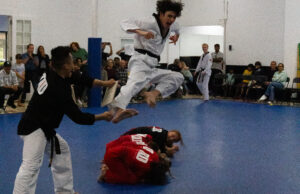The complicated case of Coach Kennedy

Bremerton High School football coach, Joseph Kennedy, recently got his job back after the Supreme Court ruled that he was unlawfully fired in 2015 for praying on the field. A lower court previously ruled that the firing was justified, before being overruled by the Supreme Court of the United States.
The details of the incident in question that got Kennedy fired are murky, and the two sides contest the specifics of the incident. “The document says the two sides ‘disagree on the specific wording,’” according to NPR. The coach says that he was prohibited from praying during the game, while students say that they felt pressured to participate.
While the Supreme Court ruled that Kennedy was within his rights when he prayed on the football field, it remains unclear if he was simply praying on his own or if he pressured students into joining him. However, if he simply encouraged students to join him but did not continue to do so if they made clear their apparent disinterest, then he did not infringe on the rights of the students. Coach Kennedy could have lied, as he would have reason to do so to clear his name. However, teachers always have students who do not like them, meaning that some students could have possibly had a motive to lie, if not stretch the truth.
When Joseph Kennedy was fired from his job in 2015, he became a martyr for many, particularly Christian Conservatives. He even appeared at a rally for then-presidential candidate Ted Cruz. Kennedy’s case has also been compared to that of Colin Kaepernick, an NFL player who kneeled during the national anthem as an act of civil disobedience. Those of a more secular bent supported Kaepernick, while those who are more religious rallied behind Kennedy, showing that those on both sides of the political spectrum support free expression–as long as it applies exclusively to them.
While supporters of the school’s decision to fire Kennedy could say that since he was a public school coach he should not have prayed at work, since public schools are not meant to involve religion, due to separation of church and state. However, if he did not pressure anyone else to join him, he did not infringe upon their individual rights; he was simply exercising his own, and those rights are protected by the First Amendment of the Constitution.
Because of the complicated and controversial nature of these cases, one needs more than “he said, she said” to form an opinion. In the age of the Internet, where clickbait can easily be mistaken for real news, it is hard to know who is truly in the right.


